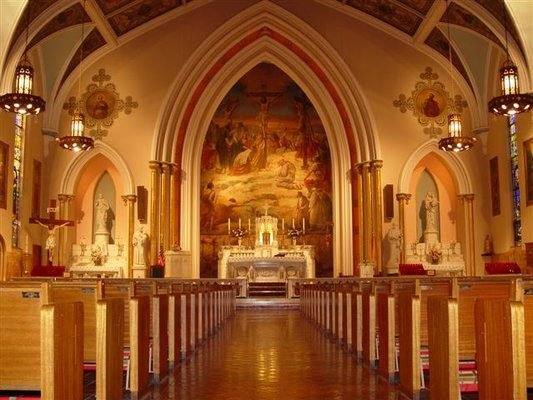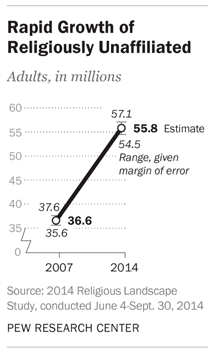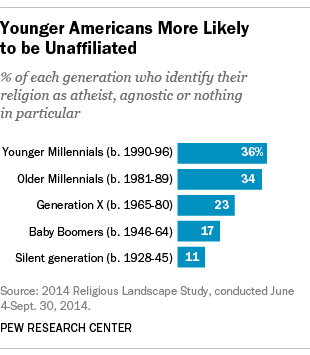
Millennials, those born between 1981-2000, (there is some debate over the exact time frame) now ages 15 to 34, are less religious than their parents and grandparents. Why they are remains a subject of intense debate. Regardless of the reasons why, millennials are less likely to be a part of an organized religion than earlier generations. According to a 2014 study by the Pew Research Center, nones, those who are not affiliated with any religion, continue to increase numerically. 55 million Americans are now a none. Granted, this is still a small percentage of the total U.S. population, but 34-36% of millennials are a none, compared to just 17% of their parents and 11% of their grandparents.
While the media tends to focus on millennials leaving Evangelical sects and churches, the Catholic church also has a millennial problem. Kaya Oakes, a writer for Religion Dispatches and a one time atheist who returned to the Catholic church of her youth, had this to say about the Catholic church and millennials:
A new survey from Catholics for Choice on the opinions of Catholic millennials as regards doctrinal issues might make the church’s traditionalists want to brace themselves. But its findings are also somewhat unsurprising to anyone who spends time around younger Catholics, whose political and social leanings mirror the open-minded stances of their increasingly non-religious peers.
Birth control and abortion, arguably the Catholic church’s most contentious issues, are not always perceived in a negative light by young Catholics. Among those polled, more than half say abortion should be legal in “almost all” or “most” cases, and 31 percent say it should be legal in “just a few” cases. Only 17 percent say it should be illegal. 78 percent say birth control should be included in insurance coverage, no matter where a woman works.
In spite of the widely mocked Catholic Vote video of young people “coming out” as believing that marriage is between a man and a woman, marriage equality is embraced by Catholic millennials. 69% “strongly” or “somewhat” support legal same-sex marriage.
In the wake of the firing of multiple Catholic school teachers who are openly gay or lesbian or married to a same-sex partner, and the ensuing grappling over Catholic teacher contracts that explicitly prevent teachers from being open about their sexuality, younger Catholics have chosen the side of the teachers. 71% say Catholic schools should not be able to fire teachers for being LGBTQ. On gender in the church, Catholic millennials follow similar thinking, with 75% supporting women having an equal role in the church.
Pope Francis is popular among young Catholics, with only two percent having a negative view of him. But the American church hierarchy is not looked on so kindly, and there is an increasing emphasis on a separation between politics and religion. A full 80 percent of respondents said they felt no need to follow the bishops’ advice when it comes time to vote, and 77 percent said Catholic politicians were under no obligation to follow the bishops either.
They are also opposed by a wide margin to bishops withholding communion to the divorced and remarried, those who support legal abortion, and those who support marriage equality.
What’s missing from this survey, however, is the question of church attendance. How much are these Catholics who disagree with and question church teaching are actually showing up? Christian Smith, the head of the National Study of Youth and Religion at Notre Dame, says the situation with Catholic millennials participating in church culture is “in fact, grim.” Only 16% of millennials self-identify as Catholic according to Pew. That 16% is the group the church is struggling to hold on to.
So if they are increasingly choosing the liberal side in the culture wars, are they really still Catholic?…
…What is clear, however, is that the more young Catholics start to embrace marriage equality, safe and legal abortion, access to contraception, and the liberal side on many other issues in the culture wars, the more of those same Catholics will also drift away from a church they perceive as incapable of change.
Perhaps they’ll attend mass on occasion, and perhaps they’ll still call themselves Catholic, but in many ways, their faith will be a loose garment rather than a straightjacket.


